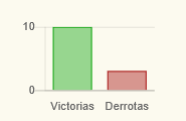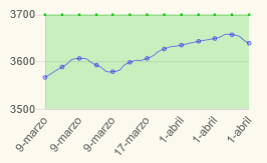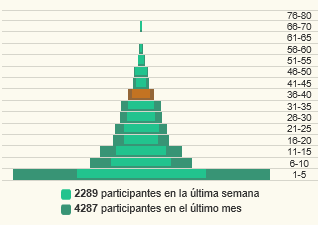Help
Play in Ludoteka
Scoring system
Game level
Ludoteka uses the level system to show the skill that each player has proved compared to the overall players.
The level is shown with a number on a green shield:
![]()
The level is specific to each variant. For example, the level achieved in Jigsaw Puzzle XS is independent from the level achieved in Jigsaw Puzzle XL.
Levels, scoring and calculations
To calculate the level, the system uses a scoring system: the player has a score for each game variant, and this is updated according to the result of each rated game.
These games are identified with the image
![]()
The level and the score are individual: the scores of the players in the same team are updated separately.
Those who have never played in a variant start from level
and 175 points.
If you have previously played in Ludoteka ClasiKa, your level will be according to the score you had in December 2021.
Both scoring systems (Ludoteka ClasiKa and the new Ludoteka) are independent.
Once the calculation is made when playing for the first time, they are treated as if they were different variants of the same game.
Therefore, the points you win or lose in each version will not be reflected in the other version.
Information, rankings and statistics
All players can see the other players levels. It is used to get a rough idea of the experience or expertise of the people you play with.
Each player can see their own score in:
- The report of each game, which is available for one month. This report also shows how the new score has been updated.
- History of played gamed.
- The evolution graphs that appear by consulting the history, and in each variant page.
The evolution of the score is a private information of the players, unless in these two cases:
- Those who have marked (on their profile) that their game history is public or accessible to their own friends.
- The current score of those who are in the Top 100 of the players who have played at least one game in the last week.
The pages dedicated to the variants of the games offer several statistical information related to the scoring system: summary of the own recent history, Top 100, and number of players in each level.

Summary of results

Evolution in the game

Distribution of players by levels
Using the scoring system
Ludoteka prevents players whose levels are too distant from competing with each other.
When playing rated games by teams, the system may ignore the preferences of players to form a team, and the teams could change when the same players play successive games.
When you start a game you are committed to play it until the end. For this reason, when a player disconnects or disregards the game, his score may be penalized. More information at disconnections
Sometimes the system can automatically detect clues showing that some game results would no longer be relevant or could distort the scoring system. In these cases, the variation in the resulting score after the game will be very low, or even null. Here are the more frequent reasons for this to happen:
- The levels of the participants are not close enough. This case can occur especially in games like Chess, in which luck is not very decisive. In this case, defeats of the best players happen due to events not related to the game, such as a connection failures.
- When someone plays repeatedly against some opponents, or the same partner. The scoring system is intended to measure all players as a whole.
- When the same player repeatedly wins, or another indication that the games may not be really competing.
If Ludoteka detects that someone has carried out any type of action aimed at falsely raising their score, it will be reduced and, in this case yes, their level will drop.
Restrict access to the game by game level
On the contrary, in general, games played in tournaments are more valuable for the calculations of the rating system.
The system shows rated games mainly to those who have a score closest to the player who opens the game.
But the opener can choose to further adjust this range to a level closer to his own. If you place the two level shields together, the system ensures that the levels of participants are very close. It should be noted that the game may take longer to complete.
If the distance between the shields is wider, more distant level players can access. And by placing the shields at the ends the system allows everyone to play, regardless of their level, so that matches usually are completed faster.
This system is used only to open a new game. Once finished, in case of using the repeat option, if one of the participants leaves, the system uses the standard limits to allow access to new players.
Advantages of playing rated or unrated games
Playing rated games offers some advantages:
- The chance to level up gives an extra motivation to play.
- Usually the games are completed faster, because most of the players prefer rated games.
- It gives you the information about the skill shown by the rivals, and the system tries to avoid very unbalanced games.
- Players rarely leave games.
But also playing unrated games has some other advantages:
- The system allows you to freely choose rivals and partners.
- Playing with friends, games can be set No watch to play calmly.
- Players tend to be friendlier and more willing to chat.
Tips related to the scoring system
Trying to level up is usually one of the biggest motivations for players. But you must understand that in Ludoteka the level is mainly an indication to know of each player's skill. Therefore, you cannot expect that your level will continue to rise again and again; it will work more like a thermometer: when you start playing a specific variant, you will surely raise your level frequently, but in the long term it will remain quite fixed, and level up will be an occasional event after a streak of results.
Regarding the score, we allow ourselves to give you some advice:
- Avoid thinking of it as a competition. If for you leveling up is an incentive, enjoy it, but be aware that in almost all games luck influences and therefore your score will surely have many ups and downs.
- Very good players join in Ludoteka; many of them have been playing for years, and precisely they like Ludoteka for this competitiveness. If you cannot reach their level, take it easy; you should better try to learn from their game.
- Play while you have fun doing it. Do not set yourself a goal for which you must work by playing many games. If at some point you start to get scratched because losing makes you upset, find another task, another game or other entertainment, or at least take a break.
- Do not abandon the games because you are losing. In addition to disrespecting rivals, you will be harmed because the system will learn your habit and you will immediately lose the games as soon as you have a connection problem or you are absent for a few seconds.
- Do not disparage or reproach your partner, even if you think they are not playing well. Also do not reproach your rivals when it seems they are luckier than you; in this case, they could think that you don't know how to lose and that you behave in a childish way.